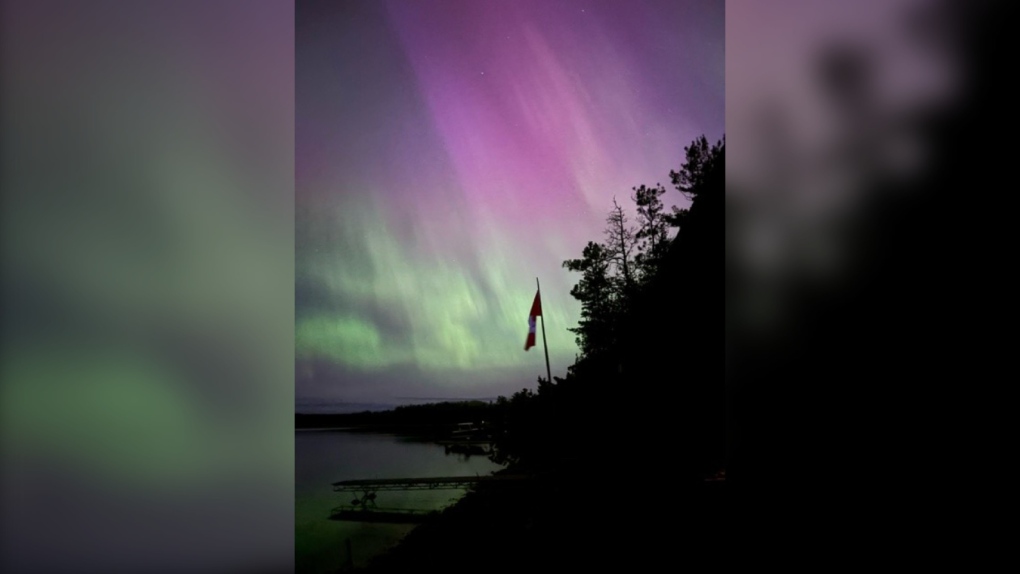Northern lights dance across the night sky in northern Ont.
The most powerful geomagnetic storm in the past 20 years impacted Earth on the night of May 10-11, 2024, resulting in vibrant northern lights across Canada, the U.S. and Europe.
 A viewer submitted photo of the northern lights over McGregor Bay on Whitefish River First Nation. May 11, 2024. (Supplied/Evelyn Diebel)
A viewer submitted photo of the northern lights over McGregor Bay on Whitefish River First Nation. May 11, 2024. (Supplied/Evelyn Diebel)
This particular storm was so severe that the National Oceanic and Atmospheric Administration (NOAA) declared it a G4, the second highest level given to solar storms, the last of which took place in 2005, according to CTV News.
The dancing of lights in the night sky is caused by an explosion of material from the sun often called the aurora borealis. The charged particles then hit Earth's magnetic field and interact with the atmosphere, resulting in a dazzling light show.
Some in northern Ontario who missed Friday’s light show were able to see the aurora borealis on Saturday and there may still be hope for more sightings in the coming days, weather permitting, according to NOAA.
“The great news is the sun is still burping this stuff out,” Science Specialist Dan Riskin said in an interview with CP24.
"So we should get a similar show."
Riskin told CP24 that it can be difficult to know when and where the auroras will fill up the night sky, but in Ontario between 11 p.m. and 5 a.m. is usually prime time for viewing.
Cloudy skies and light pollution can impact viewing, so the northern lights are best seen in clear skies and away from major sources of light, such as large cities.
Click the link above for some highlights of the views in northern Ontario.
Got a photo you'd like to share? Please send us an email at Weather.Pictures@bellmedia.ca.
-- With files from CTVNewsLondon.ca web writer Ashley Hyshka and CTV News Toronto's Hannah Alberga & Abby O'Brien
CTVNews.ca Top Stories

W5 Investigates 'I never took part in beheadings': Canadian ISIS sniper has warning about future of terror group
An admitted Canadian ISIS sniper held in one of northeast Syria’s highest-security prisons has issued a stark warning about the potential resurgence of the terror group.
'Absolutely been a success': Responders looks back at 988, Canada's Suicide Crisis Helpline, one year later
In its first year, responders for Canada's Suicide Crisis Helpline, known as 988, have answered more than 300,000 calls and texts in communities nationwide.
Prime Minister Trudeau meets Donald Trump at Mar-a-Lago
Prime Minister Justin Trudeau landed in West Palm Beach, Fla., on Friday evening to meet with U.S.-president elect Donald Trump at Mar-a-Lago, sources confirm to CTV News.
Nova Scotia PC win linked to overall Liberal unpopularity: political scientist
Nova Scotia Premier Tim Houston is celebrating his second consecutive majority mandate after winning the 2024 provincial election with 43 seats, up from 34. According to political science professor Jeff MacLeod, it's not difficult to figure out what has happened to Liberals, not just in Nova Scotia but in other parts of Canada.
'Mayday! Mayday! Mayday!': Details emerge in Boeing 737 incident at Montreal airport
New details suggest that there were communication issues between the pilots of a charter flight and the control tower at Montreal's Mirabel airport when a Boeing 737 made an emergency landing on Wednesday.
Hit man offered $100,000 to kill Montreal crime reporter covering his trial
Political leaders and press freedom groups on Friday were left shell-shocked after Montreal news outlet La Presse revealed that a hit man had offered $100,000 to have one of its crime reporters assassinated.
Questrade lays off undisclosed number of employees
Questrade Financial Group Inc. says it has laid off an undisclosed number of employees to better fit its business strategy.
Cucumbers sold in Ontario, other provinces recalled over possible salmonella contamination
A U.S. company is recalling cucumbers sold in Ontario and other Canadian provinces due to possible salmonella contamination.
Billboard apologizes to Taylor Swift for video snafu
Billboard put together a video of some of Swift's achievements and used a clip from Kanye West's music video for the song 'Famous.'


































